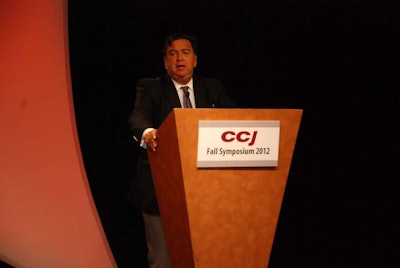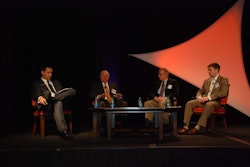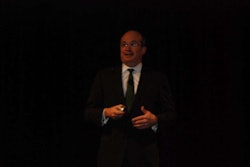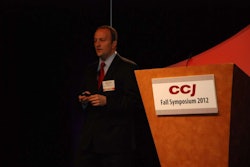
Natural gas and renewable energy sources will be the big winners in a new energy bill, he said, calling natural gas “the fuel of the future” and “the bridge fuel to renewables.” He predicted a new EPA standard on fracking over the next couple of years, despite the controversy over the process used to extract petroleum and natural gas from shale rock. “I don’t think movements in some states to stop fracking will succeed,” he said.
Other components of a new energy policy will include approval of the Keystone Pipeline, extension of the wind energy tax credit and continuing support for solar despite political setbacks, he said. Richardson predicted that every state will need to get between 20 percent and 30 percent of its energy from renewable sources in the near future. We’ll also see strong energy efficiency measures on buildings and all sectors of the economy, he said, “not necessarily mandated, but with incentives to reach certain levels.” And under President Obama’s all-of-the-above energy strategy, he believes there will be more drilling on public lands and in the oceans.
Use of nuclear power will be reduced worldwide but will stay basically the same in the U.S., Richardson said. “Nuclear is clean — it doesn’t emit greenhouse gas emissions,” he said, “but the problem is what you do with the waste.” He voiced concern about the future of coal, which currently contributes 20 percent of our energy. “When I heard environmental groups talk about clean coal during the election I was encouraged. I don’t hear that anymore,” he said, voicing concern over the coal industry’s ability to change and find new ways to develop resources.
Richardson was positive about the nation’s energy future, citing a report that predicts the U.S. will becomes the world’s largest oil and gas producer within 20 years, surpassing Saudi Arabia. “At a time when there are huge interruptions in the Middle East, the price of oil has not dramatically shot up,” he said. “Price fluctuations through political developments have not been as intense as they’ve been in the past. This means a stabilized market of energy is happening around the world.”
Turning to infrastructure, Richardson said America needs an infrastructure bank — a combination of public and private funds to deal with our aging roads and bridges. “At the state level there has to be public-private partnerships,” he said and predicted a job creation bill that will come out this summer will include infrastructure funds.
To help influence the outcome of the next four years, trucking “has to be part of this debate,” Richardson said and encouraged fleet executives to push for government incentives to help deal with the rising cost of fuel economy standards and high diesel prices. “You shouldn’t feel that you have your hand out because you are asking for incentives,” he said. “The country has been built on research and incentives. but you have to be creative in what you ask for. While citing few specifics, Richardson encouraged the trucking industry to “use your elbows to come up with something that makes you competitive because the country depends on you.”











